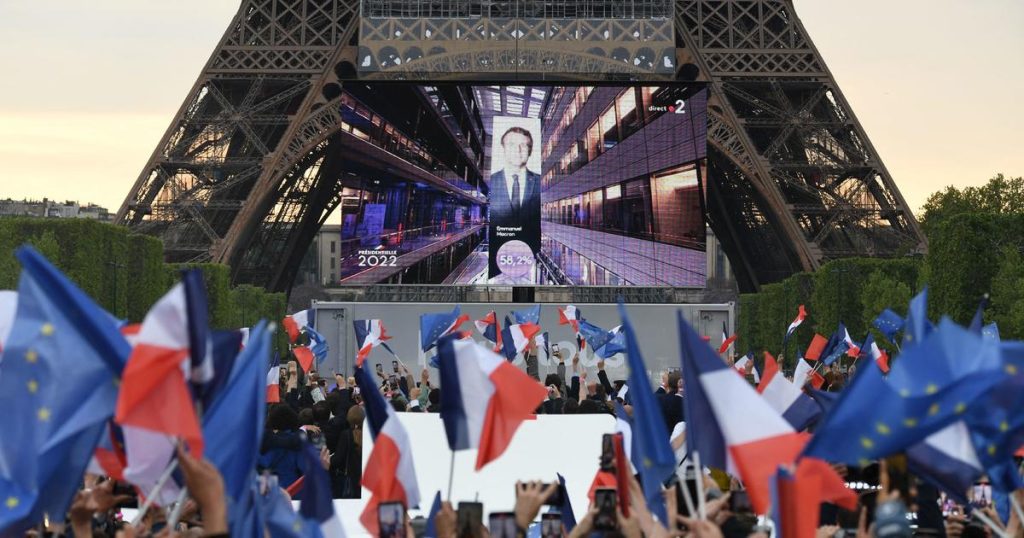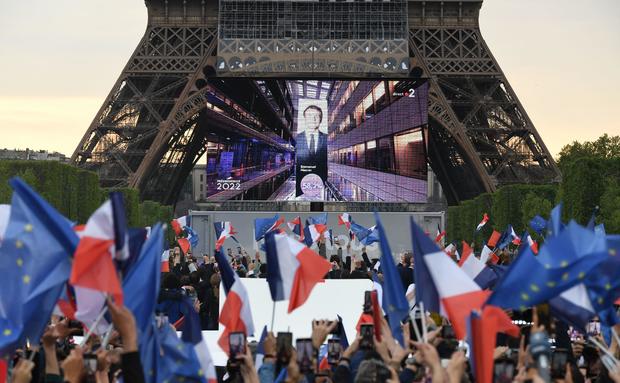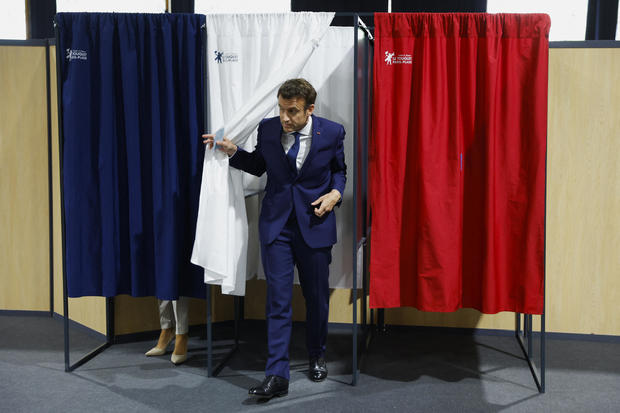
Paris – French President Emmanuel Macron was re-elected for a second term on Sunday, according to forecasts by polling agencies. Central Russia Invasion of UkraineThe result provided the EU with the reassurance of leadership stability in the bloc’s only nuclear-armed power, and was immediately praised by France’s allies.
A second five-year term for centrist Macron spared France and its allies the seismic turmoil of the wartime transition of power to Macron’s populist rival Marine Le Pen, who quickly conceded defeat on Sunday night but was still on track to deliver the best show ever. for its violent extremist nationalist policies.
During her campaign, Le Pen vowed to weaken France’s relations with the 27 countries of the European Union, NATO and Germany, moves that would shake up Europe’s security architecture as the continent grapples with its worst conflict since World War II. Le Pen also spoke out against European Union sanctions on Russian energy supplies and faced scrutiny during the campaign because of her past friendship with the Kremlin.
Bertrand Guay/AFP via Getty Images
A chorus of European leaders hailed Macron’s victory. “Democracy wins, Europe wins,” said Spanish Prime Minister Pedro Sanchez.
“Together we will make France and Europe move forward,” European Commission President Ursula von der Leyen wrote on Twitter.
Italian Prime Minister Mario Draghi hailed Macron’s victory as “fantastic news for the whole of Europe” and a boost to the European Union “as a hero in the greatest challenges of our time, beginning with the war in Ukraine”.
Ukrainian President Volodymyr Zelensky also tweeted a congratulatory message in French, calling Macron a “true friend of Ukraine”.
With more than three-quarters of the votes counted, Macron led by 55% to Le Pen’s 45%. Polling agencies predicted that once all the votes were counted, Macron’s winning margin would be well above 10 points, although smaller than when they first faced off in 2017.
Macron is the first French president in 20 years to win re-election, since incumbent Jacques Chirac defeated Le Pen’s father in 2002.
Le Pen called her results a “brilliant victory,” saying, “In this defeat, I can’t help but feel a kind of hope.”
Breaking the 40% vote threshold is unprecedented for the French far-right. Le Pen was beaten 66% to 34% by Macron in 2017 and her father won less than 20% against Chirac.
Gonzalo Fuentes/AFP
She and hard-left leader Jean-Luc Mélenchon, one of the 10 candidates eliminated in the first round on April 10, quickly advanced Sunday night in France’s June legislative elections, urging voters to give them a parliamentary majority to block Macron.
Le Pen’s result this time rewarded her years-long effort to make her far-right policies more palatable to voters. She campaigned vigorously on cost-of-living issues, and achieved profound successes among blue-collar voters in disaffected rural communities and in former industrial centers.
The drop in support for Macron compared to five years ago suggests a tough battle awaits the president to rally the people behind him in his second term. Many French voters find the 2022 presidential rematch less convincing than in 2017, when Macron was an unknown factor.
Left-wing voters — unable to identify with the centrist president or Le Pen’s violent nationalist program — often agonized over the options available on Sunday. Some reluctantly headed to the polls only to stop Le Pen, and cast their unfunny votes for Macron.
“The least option was worse,” said Stephanie David, a logistics worker who backed a Communist candidate in the first round.
It was an impossible choice for retired Jean-Pierre Roux. Having also voted for communism in the first round, he threw an empty envelope into the ballot box on Sunday, ignoring Le Pen’s policies and what he saw as Macron’s arrogance.
“I’m not against his ideas but I can’t stand that person,” Rowe said.
In turn, Marianne Arbery, voting in Paris, cast his vote for Macron “to avoid a government that finds itself with fascists and racists.”
“There is a real danger,” the 29-year-old said.
Macron entered the vote by a wide margin in the polls, but faced a ripped, anxious and tired electorate. The war in Ukraine and the COVID-19 pandemic hit Macron’s first term, as did months of violent protests against his economic policies.
Appealing to working-class voters struggling with rising prices, Le Pen vowed that lowering the cost of living would be her priority and argued that Macron’s presidency has left the country deeply divided.
Macron has sought to appeal to immigrant and religious minority voters, notably because of Le Pen’s proposed policies that target Muslims and put French citizens first for jobs and benefits. He also touted his environmental and climate achievements, hoping to attract young voters who backed leftist candidates in the first round of voting.

“Travel specialist. Typical social media scholar. Friend of animals everywhere. Freelance zombie ninja. Twitter buff.”







More Stories
Taiwan is preparing to face strong Typhoon Kung-ri
Israel orders residents of Baalbek, eastern Lebanon, to evacuate
Zelensky: North Korean forces are pushing the war with Russia “beyond the borders”